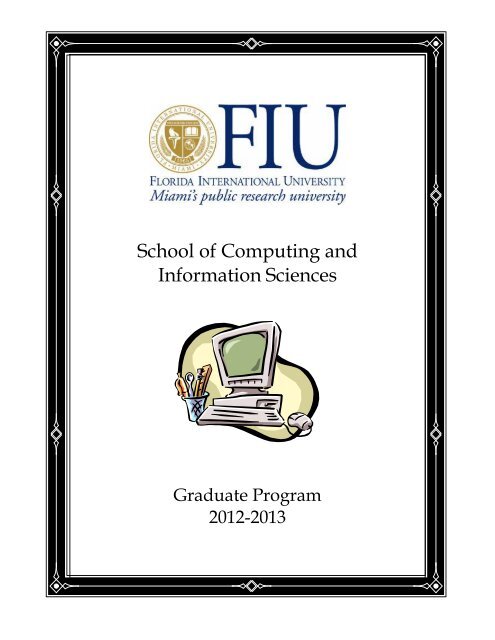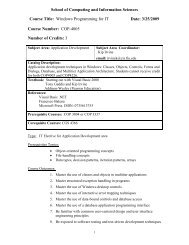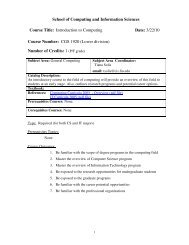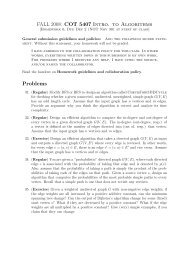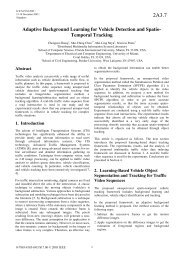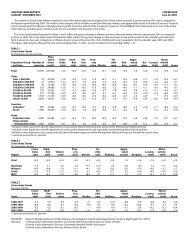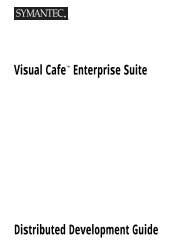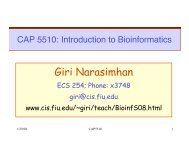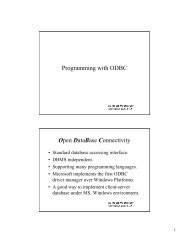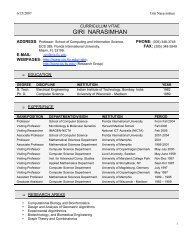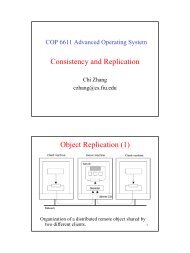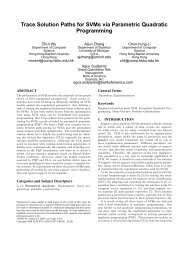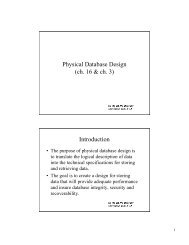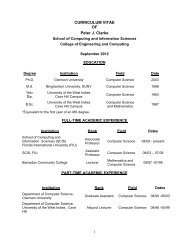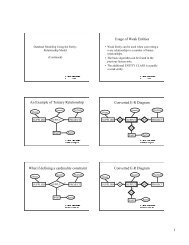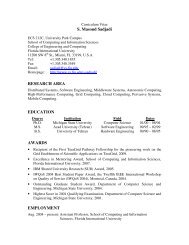Graduate Program Booklet - School of Computing and Information ...
Graduate Program Booklet - School of Computing and Information ...
Graduate Program Booklet - School of Computing and Information ...
You also want an ePaper? Increase the reach of your titles
YUMPU automatically turns print PDFs into web optimized ePapers that Google loves.
<strong>School</strong> <strong>of</strong> <strong>Computing</strong> <strong>and</strong><br />
<strong>Information</strong> Sciences<br />
<strong>Graduate</strong> <strong>Program</strong><br />
2012-2013
1 Overview<br />
<strong>Graduate</strong> <strong>Program</strong> in Computer Science<br />
Florida International University<br />
July 2012<br />
This document describes the requirements for students entering the graduate program with the intention <strong>of</strong><br />
receiving the Master’s Degree or Ph.D. Degree in the <strong>School</strong> <strong>of</strong> <strong>Computing</strong> <strong>and</strong> <strong>Information</strong> Sciences<br />
(SCIS). While this guide is intended to be self-contained <strong>and</strong> accurate, SCIS reserves the right to correct<br />
errors, when found, without further notice to students. It is the students’ responsibility to ensure that they<br />
are in compliance with both SCIS <strong>and</strong> <strong>Graduate</strong> <strong>School</strong> requirements.<br />
Failure to follow University guidelines (http://gradschool.fiu.edu/PoliciesProcedures.html) <strong>and</strong> deadlines<br />
(http://gradschool.fiu.edu/CalendarDeadlines.html) could result in a delay in graduation. It is your<br />
responsibility to give the affected faculty time to meet any deadlines.<br />
2 Electronic Access to <strong>Graduate</strong> <strong>Information</strong><br />
<strong>Information</strong> about the graduate program is available electronically through several sources. Our URL is<br />
http://www.cis.fiu.edu/programs/grad, from which you can find a host <strong>of</strong> documents (including the latest<br />
version <strong>of</strong> this guide) relating to the computer science program at FIU. You can also send mail to the<br />
general alias grad-info@cis.fiu.edu, or contact faculty members individually.<br />
3 Points <strong>of</strong> Contact<br />
For further questions or clarification, the following people may be <strong>of</strong> help:<br />
Ms. Olga Carbonell (ocarbone@cis.fiu.edu), <strong>Graduate</strong> <strong>Program</strong> Secretary, (305) 348-2744: contact if you<br />
are not currently enrolled, or if you are enrolled <strong>and</strong> have questions relating to contracts, financial aid, etc.<br />
Dr. Shu-Ching Chen (chens@cis.fiu.edu), <strong>Graduate</strong> <strong>Program</strong> Director <strong>and</strong> <strong>Graduate</strong> Advisor, (305) 348-<br />
2036: contact for advising <strong>and</strong> other graduate academic issues.<br />
<strong>Graduate</strong> assistants should see the <strong>Graduate</strong> <strong>Program</strong> Secretary immediately upon arrival to complete<br />
required paperwork.
4 General <strong>Information</strong><br />
4.1 Degrees Offered<br />
The <strong>School</strong> <strong>of</strong> <strong>Computing</strong> <strong>and</strong> <strong>Information</strong> Sciences (SCIS) <strong>of</strong>fers three Master <strong>of</strong> Science degrees, <strong>and</strong> a<br />
Doctor <strong>of</strong> Philosophy degree. The Master <strong>of</strong> Science degree in Computer Science provides study in state<strong>of</strong>-the-art<br />
computer applications as well as an introduction to the theoretical foundations <strong>of</strong> computer<br />
science. The Master <strong>of</strong> Science degree in Telecommunications <strong>and</strong> Networking is intended to provide study<br />
in state-<strong>of</strong>-the-art telecommunications <strong>and</strong> networking technologies <strong>and</strong> management. The Master <strong>of</strong><br />
Science in <strong>Information</strong> Technology is intended to educate students in the area <strong>of</strong> technical aspects <strong>of</strong><br />
<strong>Information</strong> <strong>and</strong> is ideally suited for those who wish to obtain a higher level degree in <strong>Information</strong><br />
Technology <strong>and</strong> seek employment in the IT industry. The Doctor <strong>of</strong> Philosophy in Computer Science is<br />
designed to provide study in all major areas <strong>of</strong> computer science while leading to the frontiers <strong>of</strong><br />
knowledge in a chosen field <strong>of</strong> concentration.<br />
4.2 Areas <strong>of</strong> Study<br />
There are many areas <strong>of</strong> specialization within the <strong>School</strong>, including:<br />
� Database systems, including database design, database management systems <strong>and</strong> applications, database<br />
theory <strong>and</strong> implementation, database machines, distributed databases, information retrieval in<br />
heterogeneous databases, multimedia databases, data mining <strong>and</strong> digital libraries.<br />
� S<strong>of</strong>tware Engineering, including large-scale s<strong>of</strong>tware design, programming language environments,<br />
s<strong>of</strong>tware development <strong>and</strong> maintenance methodologies, object-oriented techniques, s<strong>of</strong>tware reuse, <strong>and</strong><br />
s<strong>of</strong>tware quality assurance.<br />
� Parallel <strong>and</strong> distributed systems, including formal specification methodologies, distributed file<br />
systems, distributed multimedia systems <strong>and</strong> operating systems.<br />
� Computer networks, including network protocols, multimedia networking, <strong>and</strong> wireless<br />
communications.<br />
� Theory, including algorithms <strong>and</strong> data structures, programming languages, computer security, program<br />
verification, <strong>and</strong> logic.<br />
� Intelligent systems, including artificial intelligence, machine learning, neural networks, expert systems,<br />
intelligent tutoring systems, affective computing, intelligent user interfaces, intelligent agents for<br />
health communication.<br />
� Cognitive Science, with emphasis on the philosophical, psychological, <strong>and</strong> linguistic underpinnings <strong>of</strong><br />
artificial intelligence.<br />
� Bioinformatics <strong>and</strong> Computational Biology.<br />
4.2.1 High-Performance Database Research Center<br />
Naphtali D. Rishe, Director<br />
The High-performance Database Research Center (HPDRC) conducts research on database management<br />
systems <strong>and</strong> various applications, leading to the development <strong>of</strong> new types <strong>of</strong> database systems <strong>and</strong> the<br />
refinement <strong>of</strong> existing database systems, as well as on the dissemination <strong>of</strong> information via the Internet.<br />
The HPDRC, a research division <strong>of</strong> SCIS, has a strong commitment to training graduate students <strong>and</strong><br />
preparing them for their future roles as scholars <strong>and</strong> specialists employed by industry. It has been awarded<br />
over $40 million in research grants <strong>and</strong> donations by Government <strong>and</strong> Industry, including NASA, NSF,<br />
IBM, DoI, <strong>and</strong> the USGS.<br />
With current funding from the National Science Foundation <strong>and</strong> Industry, HPDRC is presently<br />
collaborating with a number <strong>of</strong> entities to further its mission. These groups include the College <strong>of</strong> Health<br />
- 3 -
<strong>and</strong> Urban Affairs, the Library’s GIS lab, the International Hurricane Research Center, members <strong>of</strong> the<br />
Geology, Biology, Electrical <strong>and</strong> Computer Engineering, <strong>and</strong> Environmental Studies departments, among<br />
others. As the home <strong>of</strong> one <strong>of</strong> NASA’s Regional Application Centers, HPDRC is in a prime position to<br />
perform research <strong>and</strong> development using remotely sensed data; this position has recently been further<br />
strengthened by the execution <strong>of</strong> a Cooperative Research <strong>and</strong> Development Agreement between the<br />
HPDRC <strong>and</strong> the United States Geological Survey. HPDRC is also collaborating with researchers at the<br />
University <strong>of</strong> Miami, NOAA, NASA, <strong>and</strong> space research agencies from across the state <strong>of</strong> Florida to<br />
develop better ways to store <strong>and</strong> retrieve remotely sensed data. A recently established NSF<br />
Industry/University Cooperative Research Center is enabling strong collaboration with industry as well as<br />
collaborative research with Florida Atlantic University <strong>and</strong> the University <strong>of</strong> Florida.<br />
Research Scope:<br />
The amount <strong>and</strong> varied types <strong>of</strong> geospatial information, such as remotely-sensed imagery, available today<br />
is vast, <strong>of</strong>fering numerous applications to industries <strong>and</strong> scientists in all fields. However, an inherent<br />
problem with this is the complexity <strong>of</strong>ten involved with the manipulation <strong>and</strong> extraction <strong>of</strong> these data.<br />
Spatial data sets come from varied sources <strong>and</strong> in many different formats, <strong>of</strong>ten requiring separate<br />
specialized geographic systems to view, extract <strong>and</strong> manipulate them. The time, expense <strong>and</strong> level <strong>of</strong><br />
difficulty introduced by such applications preclude their utilization by many potential users. In order to<br />
facilitate access to this growing collection <strong>of</strong> visual information, the HPDRC has created TerraFly, a Webbased<br />
Geographic <strong>Information</strong> Viewer that allows its users to “fly” through geospatial data using nothing<br />
but a typical Internet browser.<br />
HPDRC's public service at http://TerraFly.fiu.edu has approximately 10,000 unique users per day. The<br />
TerraFly project has been covered by worldwide press (e.g. The New York Times, USA Today, NPR),<br />
Science <strong>and</strong> Nature journals, <strong>and</strong> TV news programs. TerraFly applies the database technology developed<br />
at HPDRC for the storage <strong>and</strong> retrieval <strong>of</strong> data, allowing its users to “fly over” <strong>and</strong> manipulate the retrieved<br />
data. The database used by TerraFly currently contains textual, remotely-sensed <strong>and</strong> vector data, which can<br />
be viewed <strong>and</strong> manipulated by experts or lay users via applets using any st<strong>and</strong>ard browser, like Internet<br />
Explorer or Firefox, without the installation <strong>of</strong> any specialized GIS programs.<br />
The Center also conducts research on such theoretical <strong>and</strong> applied issues as Internet-distributed<br />
heterogeneous databases, database design methodologies, database design tools, information analysis,<br />
multimedia databases, database languages, data compression, spatial databases, <strong>and</strong> data visualization.<br />
For details, visit the URL http://hpdrc.cis.fiu.edu<br />
4.2.2 Center for Advanced Distributed Systems Engineering<br />
Xudong He, Director<br />
The Center for Advanced Distributed Systems Engineering (CADSE) is a research division <strong>of</strong> SCIS at<br />
Florida International University. Its mission is to establish a streamlined research, technology exploration<br />
<strong>and</strong> advanced training program in the field <strong>of</strong> distributed <strong>and</strong> Internet-based computing. The Center’s R&D<br />
cover both theoretical <strong>and</strong> practical aspects <strong>of</strong> distributed s<strong>of</strong>tware engineering, i.e., using engineering<br />
methods <strong>and</strong> technologies to tackle development problems <strong>of</strong> complex, reliable, <strong>and</strong>/or real-time distributed<br />
systems. Our research has been supported by grants <strong>and</strong> contracts for over $5 million by National Science<br />
Foundation, Air Force Office <strong>of</strong> Scientific Research, Air Force Research Laboratory Rome Site, Army<br />
Research Office, NASA <strong>and</strong> Industry. Current projects <strong>of</strong> the Center focus on formal design methods for<br />
distributed systems, distributed system <strong>and</strong> s<strong>of</strong>tware architecture, distributed object technology, <strong>and</strong><br />
s<strong>of</strong>tware testing.<br />
Current research projects <strong>of</strong> the Center focus on the following aspects:<br />
� Formal Methods<br />
� S<strong>of</strong>tware Architecture<br />
� S<strong>of</strong>tware Testing<br />
� S<strong>of</strong>tware Reuse<br />
� Object-Oriented Technology<br />
- 4 -
� Distributed Multimedia <strong>Information</strong> Systems<br />
For details, visit the URL http://cadse.cis.fiu.edu<br />
4.2.3 Distributed Multimedia <strong>Information</strong> Systems Laboratory<br />
Dr. Shu-Ching Chen, Director<br />
The Distributed Multimedia <strong>Information</strong> Systems Laboratory (DMIS) has a mission to conduct leading<br />
edge research in multimedia database systems, multimedia data mining, multimedia networking, GIS <strong>and</strong><br />
Intelligent Transportation Systems.<br />
Other research areas <strong>of</strong> this division include:<br />
� Multimedia Communications <strong>and</strong> Networking<br />
� Digital Library<br />
� 3D Animation<br />
� Distributed <strong>Computing</strong><br />
� WWW<br />
This laboratory currently receives funding from the Florida Department <strong>of</strong> Insurance, NSF, International<br />
Hurricane Research Center (IHRC)/FDCA/FEMA, Naval Research Laboratory/ITT, <strong>and</strong> NOAA.<br />
For more details, you can visit their web page at: http://dmis.cis.fiu.edu<br />
4.2.4 Systems Research Laboratory<br />
Raju Rangaswami, Director<br />
The mission <strong>of</strong> the Database <strong>and</strong> Systems Research Laboratory (DSRL) is to perform cutting-edge research<br />
on (i) extracting knowledge from structured <strong>and</strong> unstructured databases, <strong>and</strong> (ii) building highperformance,<br />
reliable, power-efficient, <strong>and</strong> secure systems.<br />
Current projects at DSRL include:<br />
� <strong>Information</strong> Discovery on Clinical <strong>and</strong> Biomedical Databases<br />
� Searching Domain Data Graphs<br />
� Searching Text Streams<br />
� Analyzing Disaster Management Data<br />
� Semistructured Storage Systems<br />
� Resource Management in Virtualized Data Centers<br />
� Energy-efficient Mobile <strong>and</strong> RAID Storage Systems<br />
� Reliable RAID Storage Systems<br />
� High-performance Storage Systems<br />
� Block-layer Storage Infrastructure for Operating Systems<br />
DSRL sponsors include the National Science Foundation <strong>and</strong> the Department <strong>of</strong> Energy.<br />
For more details, you can visit the DSRL web page at: http://dsrl.cs.fiu.edu.<br />
4.2.5 Bioinformatics Research Group (BioRG)<br />
Giri Narasimhan (Head), Tao Li<br />
The Bioinformatics Research Group (BioRG) conducts research on problems in the interdisciplinary fields<br />
<strong>of</strong> Bioinformatics, Biotechnology, Data Mining, <strong>and</strong> <strong>Information</strong> Retrieval. The group’s research projects<br />
- 5 -
includes Comparative Genomics <strong>of</strong> Bacterial genomes, Genomic databases, Pattern Discovery in sequences<br />
<strong>and</strong> structures, micro-array data analysis, prediction <strong>of</strong> regulatory elements, primer design, probe design,<br />
phylogenetic analysis, medical image processing, image analysis, data integration, data mining, information<br />
retrieval, knowledge discovery in electronic medical records, <strong>and</strong> much more.<br />
The group also collaborates with scientists from a wide variety <strong>of</strong> fields outside computer science including<br />
biology, medicine, biophysics, biochemistry, pharmacology, finance, social sciences, statistics,<br />
mathematics, environmental sciences, soil sciences, <strong>and</strong> more. This is an active group with a strong<br />
publication record. The National Institutes <strong>of</strong> Health <strong>and</strong> the National Science Foundation have funded this<br />
group's research.<br />
For details on the members, publications, s<strong>of</strong>tware, <strong>and</strong> recently graduated students, visit the URL<br />
http://biorg.cis.fiu.edu<br />
4.2.6 Affective Social <strong>Computing</strong> Laboratory (ASCL)<br />
Christine Lisetti, Director<br />
The Affective Social <strong>Computing</strong> Laboratory (ASCL) conducts research in Affective <strong>Computing</strong>, a broad<br />
field that explores the computational nature <strong>of</strong> affective phenomena, such as emotions, moods, personality,<br />
<strong>and</strong> attitudes, <strong>and</strong> their role in human intelligence, communication <strong>and</strong> decision-making. Such insights can<br />
then be applied to allow computers to account for <strong>and</strong> adapt to human affect. This research is highly<br />
interdisciplinary in nature; it lies at the intersection <strong>of</strong> Artificial Intelligence (AI) <strong>and</strong> Human-Computer<br />
Interaction (HCI), <strong>and</strong> it involves knowledge from Psychology <strong>and</strong> Communication.<br />
Our research goal is to create engaging, embodied socially intelligent agents that can learn to interact with<br />
humans via expressive multi-modalities in a variety <strong>of</strong> contexts involving socio-emotional content (e.g.<br />
social companions, cyber-therapy, intelligent training systems, serious games). In a specific context, these<br />
agents must:<br />
� sense the affect, preferences, <strong>and</strong> personality <strong>of</strong> their interlocutor (bio-sensing, pattern matching,<br />
knowledge elicitation <strong>and</strong> representation <strong>of</strong> affective phenomena);<br />
� make decisions (logic-based <strong>and</strong> probabilistic reasoning) that are socially acceptable based on<br />
their dynamic user-model (knowledge representation);<br />
� carry out their interactions (HCI design principles) within the domain-knowledge (expert systems)<br />
� while displaying social competence (social communication theory);<br />
� learn to tailor <strong>and</strong> adapt (machine learning) their interactive styles to the specific socio-emotional<br />
pr<strong>of</strong>ile (user-modeling) <strong>of</strong> their human counterpart.<br />
Although application domains <strong>of</strong> interest are manifold, we are particularly interested in the domains <strong>of</strong><br />
health communication <strong>and</strong> health promotion.<br />
4.3 <strong>Computing</strong> Resources<br />
SCIS <strong>Computing</strong> Facilities are located on the second <strong>and</strong> third floors <strong>of</strong> the Engineering <strong>and</strong> Computer<br />
Science building. The facility consists <strong>of</strong> a large number <strong>of</strong> networked workstations with contemporary<br />
hardware/s<strong>of</strong>tware, which are used by faculty, staff, <strong>and</strong> graduate students.<br />
The majority <strong>of</strong> these machines is dispersed throughout the various research <strong>and</strong> open laboratories located<br />
on the second floor. These systems are connected to the campus backbone that also provides our interface<br />
to the Internet.<br />
<strong>Computing</strong> facilities are to be used only for work directly related to duties as a graduate student. Under no<br />
circumstances should students allow their accounts to be used by third parties.<br />
- 6 -
Any student who is determined to have used the computer unethically will be expelled from the graduate<br />
program. This includes accessing other user's data (files, mail, etc.) without their permission (even if the<br />
protection modes allow access).<br />
Any student who is found to have used the computing facilities in violation <strong>of</strong> any state or Federal laws will<br />
be expelled from the University <strong>and</strong> prosecuted to the full extent <strong>of</strong> the law. This includes using the<br />
computer to distribute material in violation <strong>of</strong> copyright laws, <strong>and</strong> attempting to violate security protocols<br />
on both FIU <strong>and</strong> non-FIU machines.<br />
- 7 -
5. General <strong>Information</strong> for prospective students<br />
5.1 Admissions Process<br />
5.1.1 Application<br />
The admissions application can be completed online at http://gradschool.fiu.edu/admissions.html. <strong>Graduate</strong><br />
Admissions will promptly acknowledge receipt, notify the applicant <strong>of</strong> any deficiencies (e.g. missing<br />
transcripts) <strong>and</strong> forward all relevant documents to the <strong>School</strong> <strong>of</strong> <strong>Computing</strong> <strong>and</strong> <strong>Information</strong> Sciences.<br />
Submission deadlines are indicated at http://gradschool.fiu.edu/CalendarDeadlines.html. Please note that<br />
<strong>Graduate</strong> Admissions will only forward complete applications to SCIS; if your application is incomplete<br />
(e.g. missing a TOEFL score), SCIS will not see the application, nor will SCIS be able to act upon it.<br />
The <strong>School</strong> recommends that applications be submitted as early as possible (six months prior to the<br />
beginning <strong>of</strong> enrolled term). Foreign students should begin the process even earlier. Terms generally begin<br />
in late August for Fall, early January for Spring, <strong>and</strong> early May for Summer.<br />
All applicants should arrange for three letters <strong>of</strong> recommendation to be mailed to the following address:<br />
Admissions Coordinator<br />
College <strong>of</strong> Engineering & <strong>Computing</strong><br />
Florida International University<br />
EC 2460<br />
10555 W. Flagler Street<br />
Miami, FL 33174<br />
Applicants may use the recommendation form located at the following website:<br />
http://www.cis.fiu.edu/programs/grad/docs/RECOMLTR.doc<br />
<strong>Graduate</strong> Admissions formally notifies the applicants.<br />
5.1.2 Records<br />
One <strong>of</strong>ficial copy <strong>of</strong> all transcripts <strong>and</strong> test scores must be sent to the College <strong>of</strong> Engineering & <strong>Computing</strong><br />
at the above mentioned address.<br />
Official transcripts <strong>of</strong> academic records from each college or university attended must be forwarded by that<br />
institution. Transcripts in possession <strong>of</strong> the applicants will not be accepted. It is the responsibility <strong>of</strong> all<br />
degree-seeking applicants to make arrangements to take the <strong>Graduate</strong> Record Examination (GRE) <strong>and</strong><br />
request that the Educational Testing Service (ETS) mail the <strong>of</strong>ficial test results directly to FIU. Foreign<br />
applicants whose native language is not English must take the Test <strong>of</strong> English as a Foreign Language<br />
(TOEFL) exam <strong>and</strong> have their scores submitted directly to FIU by ETS. In addition, foreign applicants are<br />
required to submit financial statements verifying adequate financial resources.<br />
Medical History Reports are required <strong>of</strong> all students by Student Health Services. Completion <strong>and</strong> clearance<br />
<strong>of</strong> medical history <strong>and</strong> immunization reports are required to validate registration. A medical history form<br />
will be mailed shortly after the receipt <strong>of</strong> the application by the FIU <strong>Graduate</strong> Admissions Office.<br />
5.2 Assistantships <strong>and</strong> Fellowships<br />
Note: Applicants interested in assistantships <strong>and</strong> fellowships should mail their résumé along with their<br />
admission application materials.<br />
There are several sources <strong>of</strong> assistantships <strong>and</strong> fellowships.<br />
5.2.1 Assistantships from SCIS<br />
Financial assistance is available on a highly competitive basis in the form <strong>of</strong> <strong>Graduate</strong> Assistantships for<br />
PhD students. Students admitted to the PhD program are automatically placed in the list for <strong>Graduate</strong><br />
- 8 -
Assistantship consideration for the Fall semester. Those students from the list who are selected as <strong>Graduate</strong><br />
Assistantship recipients will be formally notified through e-mail.<br />
Awards primarily start in the Fall semester.<br />
Only full-time students are eligible for assistantships. This means that <strong>Graduate</strong> Assistants must register for<br />
at least nine credits during the Fall <strong>and</strong> Spring <strong>and</strong> six credits during the Summer if supported during the<br />
summer <strong>and</strong> must not accept other forms <strong>of</strong> employment.<br />
<strong>Graduate</strong> Assistants are expected to assist in teaching <strong>and</strong> research duties. The exact assignment is variable<br />
<strong>and</strong> depends on the student’s progress towards degree <strong>and</strong> performance. The student’s performance is<br />
evaluated once a year; based on the evaluation a student may be given an excellence award, be given a<br />
summer appointment, or, in case <strong>of</strong> unsatisfactory performance, be dismissed.<br />
<strong>Graduate</strong> Assistants in the Ph.D. program are expected to find a faculty advisor, willing to eventually<br />
supervise their dissertation, by the end <strong>of</strong> their first year. Failure to do so may result in the non-renewal <strong>of</strong><br />
the student’s assistantship.<br />
Students in the Ph.D. program will not be supported by SCIS for more than five years.<br />
5.2.2 Assistantships from Research Projects<br />
Many faculty members have sponsored research projects, from various funding agencies, that provide<br />
Research Assistantships. These research assistantships are highly competitive <strong>and</strong> require specific<br />
background <strong>and</strong> skills, <strong>and</strong> are awarded by individual faculty members having sponsored research projects.<br />
Students should contact individual faculty members directly to apply for these assistantships.<br />
5.2.3 Fellowships<br />
SCIS may also <strong>of</strong>fer fellowships. These fellowships are highly competitive <strong>and</strong> have strict eligibility<br />
requirements. The availability <strong>of</strong> fellowships is announced at the SCIS website. Students need to follow<br />
the announcements’ instructions to apply for fellowships.<br />
5.2.4 Tuition Waivers<br />
Most Teaching <strong>and</strong> Research Assistants receive a waiver <strong>of</strong> their tuition. This is done on a competitive<br />
basis <strong>and</strong> depends on the state budget. <strong>Information</strong> on this is generally not available until the term begins.<br />
Excluding the tuition, all assistants are required to pay several service fees, such as a health fee.<br />
In 2011-2012, tuition for in-state graduate students is $383.27 (for continuing students, admitted <strong>and</strong><br />
enrolled prior to Fall 2006) or $399.95 (for new students, admitted <strong>and</strong> enrolled Fall 2006 <strong>and</strong> after) per<br />
credit for both regular course work <strong>and</strong> dissertation or thesis credit. Tuition for out-<strong>of</strong>-state <strong>and</strong><br />
international graduate students is $887.35 (for continuing students) or $904.03 (for new students) per credit<br />
hour for both regular course work <strong>and</strong> dissertation credit. <strong>Graduate</strong> students who are on a full assistantship<br />
(0.50 FTE appointment) pay only $63.86 (for continuing students) or $65.36 (for new students) per credit.<br />
<strong>Graduate</strong> students on a part-time assistantship (0.25 FTE appointment) receive an out-<strong>of</strong>-state tuition<br />
waiver, but are responsible for the in-state portion. In addition there is a $93.19 assessment each semester<br />
for the use <strong>of</strong> the campus health center <strong>and</strong> athletic fees, <strong>and</strong> students pay need to pay for parking. <strong>Graduate</strong><br />
Assistants must also pay 25% <strong>of</strong> the health insurance premium (the university will pay for the other 75% as<br />
part <strong>of</strong> the assistantship).<br />
5.3 Grade Requirements<br />
Students must maintain a Grade Point Average <strong>of</strong> at least 3.0 for courses attempted in the graduate<br />
program. Undergraduate prerequisites taken after the bachelor's degree will not count toward the graduate<br />
GPA. All courses needed for graduation must be completed with a grade <strong>of</strong> C or higher. For required core<br />
courses a more stringent rule applies (see sections on MS <strong>and</strong> PhD program). A student whose GPA falls<br />
below 3.0 will be placed on warning. If the GPA remains below 3.0 for a second semester, the student will<br />
be placed on probation. If the (cumulative) GPA is still below 3.0 for third semester, <strong>and</strong> the (third)<br />
- 9 -
semester GPA is also below 3.0, then the student will be dismissed from the graduate program. <strong>Graduate</strong><br />
assistants must maintain a GPA above 3.3. Failure to do so may result in the non-renewal <strong>of</strong> the student’s<br />
assistantship.<br />
5.4 Active Status<br />
Doctoral c<strong>and</strong>idates require a minimum <strong>of</strong> three credit hours per semester to retain active status. Master's<br />
c<strong>and</strong>idates require a minimum <strong>of</strong> one credit hour per semester to retain active status. Lapses in enrollment<br />
for two or more consecutive semesters require that the student apply for readmission subject to the<br />
admission procedures, criteria, <strong>and</strong> policies in effect at the time the reapplication is made. A student who<br />
finds it necessary to be excused from registration for two or more consecutive semesters should formally<br />
request a leave <strong>of</strong> absence from the graduate program director. Leaves will be granted only under<br />
exceptional circumstances.<br />
At the doctoral level all requirements, including the successful defense <strong>of</strong> a dissertation, must be completed<br />
within nine years <strong>of</strong> first enrollment in the doctoral program. At the Master's level all requirements,<br />
including the successful defense <strong>of</strong> a thesis (if thesis option is selected), must be completed within six years<br />
<strong>of</strong> first enrollment in the Master's program.<br />
5.5 Advisement<br />
One faculty member is designated as the <strong>Graduate</strong> Advisor. New students should see the <strong>Graduate</strong> Advisor<br />
prior to registering for their first semester. The <strong>Graduate</strong> Advisor is the person to consult concerning<br />
program requirements.<br />
5.6 University Requirements<br />
The student should keep informed <strong>of</strong> <strong>Graduate</strong> <strong>School</strong> requirements as outlined in the <strong>Graduate</strong> Catalog<br />
<strong>and</strong> FIU <strong>Graduate</strong> Policies <strong>and</strong> Procedures Manual (http://gradschool.fiu.edu/PoliciesProcedures.html).<br />
- 10 -
6 Master's <strong>Program</strong>s<br />
6.1 Admission to Master's <strong>Program</strong> in Computer Science<br />
Requirements for admission to the Master's program are as follows:<br />
A Bachelor's Degree or equivalent in Computer Science from a regionally accredited institution.<br />
A degree in a related field is acceptable if the applicant shows evidence <strong>of</strong> computer science<br />
background suitable for entry into the master’s program as judged by the <strong>Graduate</strong> Committee.<br />
Generally speaking, the minimum background is the equivalent <strong>of</strong> all prerequisites for the required<br />
graduate courses. (see Section 9)<br />
‘B’ average or better in all course work attempted while registered as an upper-division student in the<br />
Bachelor’s program, <strong>and</strong> a GRE general test score with a minimum quantitative score <strong>of</strong> 148.<br />
Three letters <strong>of</strong> recommendation from persons in a position to judge the applicant's potential success in<br />
graduate study.<br />
Approval <strong>of</strong> the <strong>Graduate</strong> Committee.<br />
Applicants whose native language is not English must score a total <strong>of</strong> 80 on the iBT (internet Based Test)<br />
TOEFL or 6.3 overall on the IELTS. TOEFL = Test <strong>of</strong> English as a Foreign Language (www.toefl.org).<br />
IELTS = International English Language Testing System (www.ielts.org).<br />
6.1.1 Master's Transfer Credit<br />
A maximum <strong>of</strong> two graduate courses may be transferred into the program from outside the University,<br />
subject to the approval <strong>of</strong> the <strong>Graduate</strong> Committee.<br />
6.1.2 Master's Degree General Requirements<br />
1. Required course work: 15 credits<br />
CEN 5011 Advanced S<strong>of</strong>tware Engineering<br />
COP 5614 Operating Systems<br />
COP 5725 Principles <strong>of</strong> Database Management Systems<br />
COT 5407 Introduction to Algorithms<br />
COT 5420 Theory <strong>of</strong> Computation I<br />
Required courses must be completed with an average <strong>of</strong> “B” or higher, <strong>and</strong> only one course may receive a<br />
grade less than "B-".<br />
2. Elective course work:<br />
a. non-thesis option: 15 credits <strong>of</strong> elective courses<br />
b. thesis option: 9 credits <strong>of</strong> elective courses <strong>and</strong> 6 credits <strong>of</strong> master’s thesis<br />
Elective courses can be selected from <strong>Graduate</strong> Course Offerings (Section 9). A maximum <strong>of</strong> 6 credits can<br />
be chosen from sections other than 9.1.1. Of these 6 credits, a maximum <strong>of</strong> 3 credits can be chosen from<br />
Section 9.2 (i.e. either a 3-credit Independent Study or a 3-credit coop course).<br />
Note: A student must comply with all University <strong>Graduate</strong> <strong>School</strong> requirements regarding enrollment <strong>and</strong><br />
deadlines.<br />
6.1.3 Master's Degree with Thesis Option<br />
This option requires the completion <strong>of</strong> a Master's Thesis (6 credits) in addition to the eight graduate courses<br />
(24 credits). A student may commence work on the Master's thesis at any time.<br />
- 11 -
6.1.3.1 Thesis Committee<br />
The student must propose to the Chairperson <strong>of</strong> the Thesis Committee consisting <strong>of</strong> three members with<br />
graduate faculty status. The Thesis Advisor is the Chairperson <strong>of</strong> the Thesis Committee. University<br />
regulations require that the Chairperson <strong>of</strong> the Thesis Committee be a member <strong>of</strong> the <strong>School</strong> <strong>of</strong> <strong>Computing</strong><br />
<strong>and</strong> <strong>Information</strong> Sciences. Form M-1 must be completed.<br />
6.1.3.2 Thesis Proposal<br />
A thesis proposal should be submitted after the Thesis Committee has been approved by the Chairperson <strong>of</strong><br />
the <strong>Graduate</strong> Committee. The proposal will be given by the Thesis Advisor to the student's Thesis<br />
Committee for review. Based on written recommendations <strong>of</strong> its members, the Thesis Committee will make<br />
a final decision. Upon acceptance <strong>of</strong> the proposal, Form M-2 will be completed, to indicate that both a<br />
committee <strong>and</strong> a proposal have been approved. Before the submission <strong>of</strong> M-2 form, the <strong>Graduate</strong> <strong>School</strong><br />
requires the M.S. c<strong>and</strong>idate to complete an on-line "Responsible Conduct <strong>of</strong> Research Certification"<br />
training course (http://www.ori.fiu.edu/responsibleConduct.html).<br />
The purpose <strong>of</strong> the proposal is to convince the Committee that the chosen thesis topic <strong>and</strong> the student's<br />
approach have a reasonable chance <strong>of</strong> success. We want to minimize the chance that the thesis will be<br />
turned down when almost completed. In particular it should<br />
� explain the basic idea <strong>of</strong> the thesis topic<br />
� argue why that topic is important<br />
� state what kind <strong>of</strong> results are expected<br />
� make plausible that these results are sufficient for a Master's thesis <strong>and</strong> that they are obtainable within<br />
the given time frame with the available resources<br />
� demonstrate the student's academic qualifications for doing the proposed work<br />
6.1.3.3 Thesis Defense<br />
The Master's thesis must be a written account <strong>of</strong> a critical <strong>and</strong> scholarly study in an area in computer<br />
science. The Thesis Committee will review it critically for both content <strong>and</strong> form. The thesis may consist<br />
<strong>of</strong>:<br />
1. independent research work,<br />
2. a critical study <strong>and</strong> analysis <strong>of</strong> known results that provide new significance <strong>and</strong> insights, or<br />
3. a significant <strong>and</strong> constructive contribution to computer applications such as s<strong>of</strong>tware development<br />
for important applications.<br />
The defense is public. The Thesis Committee makes the final pass/fail decision.<br />
6.1.4 Accelerated Master <strong>of</strong> Science in Computer Science<br />
Admission Requirements<br />
1. Current enrollment in the Bachelor’s Degree program in Computer Science at FIU.<br />
2. Completed at least 60 credits <strong>of</strong> coursework.<br />
3. Current GPA must be 3.3 or higher.<br />
4. GRE general test score with a minimum quantitative score <strong>of</strong> 148.<br />
5. International graduate student applicants whose native language is not English are required to submit a<br />
score for the Test <strong>of</strong> English as a Foreign Language (TOEFL) or for the International English Language<br />
Testing System (IELTS). A total score <strong>of</strong> 80 on the iBT TOEFL or 6.3 overall on the IELTS is required.<br />
6. Three letters <strong>of</strong> recommendation.<br />
7. Approval <strong>of</strong> the <strong>Graduate</strong> Committee.<br />
- 12 -
General Requirements<br />
The FIU Bachelor’s degree in Computer Science must be awarded before the Master’s degree.<br />
Coursework:<br />
Required Courses:<br />
Required courses must be completed with an average <strong>of</strong> “B” or higher, <strong>and</strong> only one course may receive a<br />
grade less than “B-“.<br />
CEN 5011 Advanced S<strong>of</strong>tware Engineering<br />
COP 5614 Operating Systems<br />
COP 5725 Principles <strong>of</strong> Database Management Systems<br />
COT 5407 Introduction to Algorithms<br />
COT 5420 Theory <strong>of</strong> Computation I<br />
Elective:<br />
5 courses selected from the <strong>Graduate</strong> Course Offerings subject to the same rules for regular M.S. students<br />
described in Section 6.3.<br />
Overlap:<br />
Up to 4 graduate courses (12 credits) may be used in satisfying both the Bachelor’s <strong>and</strong> Master’s degree<br />
requirements. The courses must be regular computer science graduate courses <strong>and</strong> must be approved by an<br />
undergraduate advisor to satisfy the Bachelor’s degree requirements.<br />
Additional <strong>Graduate</strong> Courses before Completing a Bachelor’s Degree<br />
A student in the accelerated M.S. program, or a “4 + 1” student, intending to take more than 4 graduate<br />
courses (12 credits) before completing a Bachelor’s degree must get pre-approval from the Dean <strong>of</strong> the<br />
<strong>Graduate</strong> <strong>School</strong>; otherwise, any additional graduate course cannot be used to satisfy the Master’s degree<br />
requirements.<br />
- 13 -
6.2 Master <strong>of</strong> Science in Telecommunications <strong>and</strong> Networking<br />
The Master <strong>of</strong> Science in Telecommunications <strong>and</strong> Networking is intended to educate individuals seeking<br />
employment with hardware <strong>and</strong>/or s<strong>of</strong>tware companies, service providers, large user organizations, or<br />
telecommunications regulatory agencies as well as for those who are employed by these<br />
companies/organizations <strong>and</strong> wish to obtain formal, higher-level, specialized degree in<br />
Telecommunications <strong>and</strong> Networking. Telecommunication <strong>and</strong> Networking students learn how to lead in<br />
the ever changing environment <strong>of</strong> real-time global information networking, telecommunications, wireless<br />
<strong>and</strong> optical strategies <strong>and</strong> how to amplify business value through communications, technologies <strong>and</strong><br />
systems. All courses in the program are categorized under the five following areas. SCIS <strong>of</strong>fers thesis <strong>and</strong><br />
non-thesis options for the Master’s Degree. The Master is a multidisciplinary program that <strong>of</strong>fers two<br />
tracks:<br />
Admissions Requirements<br />
1. In addition to the FIU graduate requirements, a student admitted to the program must have a bachelor’s<br />
degree in a related field from an accredited institution, in the case <strong>of</strong> foreign students, from an<br />
institution recognized in its own country as preparing students to continue studies at the graduate level.<br />
2. An applicant must have a GPA score <strong>of</strong> 3.0 or higher in upper level work.<br />
3. International students whose native language is not English, must take the Test <strong>of</strong> English as a Foreign<br />
Language (TOEFL) or the International English Language Testing System Test (IELTS). Minimum<br />
required score is: 550 on the paper-based test (PBT TOEFL), or 80 on the iBT TOEFL, or 6.3 overall<br />
on the IELTS test.<br />
4. The University’s required GPA <strong>and</strong> TOEFL scores are to be considered minimum requirements for<br />
admissions.<br />
<strong>Graduate</strong> Requirements<br />
The degree will be granted when the following criteria have been met:<br />
1. Recommendation <strong>of</strong> Advisor <strong>and</strong> faculty <strong>of</strong> the <strong>School</strong>.<br />
2. Certification by the Dean <strong>of</strong> the <strong>School</strong> that all requirements have been met.<br />
3. Maintain an overall GPA <strong>of</strong> at least 3.0. No grade below “C” will be accepted in any course taken to<br />
satisfy graduate program requirements.<br />
4. Completion <strong>of</strong> 30 required semester hours <strong>of</strong> graduate level in three categories:<br />
� 15 credits <strong>of</strong> required courses<br />
� 6 credits <strong>of</strong> either thesis or courses from any one focus area<br />
� 9 credits <strong>of</strong> electives.<br />
Required Courses (breadth)<br />
All students must complete the following five courses:<br />
TCN 5030 Computer Communications <strong>and</strong> Networking Technologies (or an alternate course if waived)<br />
TCN 6430 Networks Management <strong>and</strong> Control St<strong>and</strong>ards<br />
TCN 6275 Mobile <strong>Computing</strong><br />
TCN 5080 Secure Telecommunications Transactions (or CIS 5372)<br />
TCN 5640 Telecommunications Enterprise Planning <strong>and</strong> Strategy<br />
One Focus Area (depth)<br />
Students in the non-thesis option must select two courses from one focus area that aligns with their<br />
backgrounds <strong>and</strong> interests. Areas include but are not limited to s<strong>of</strong>tware, communications, policy/legal<br />
issues, wireless <strong>and</strong> security. These areas are designed to serve a wide constituency <strong>of</strong> students.<br />
- 14 -
Business Focus:<br />
TCN 5010 Telecommunications Technology Applications<br />
TCN 6880 Telecommunications Public Policy Development <strong>and</strong> St<strong>and</strong>ards<br />
TCN 6820 Telecommunications Industry Development<br />
Communications Focus:<br />
EEL 5500 Digital Communications I<br />
EEL 5501 Digital Communications II<br />
S<strong>of</strong>tware Focus:<br />
TCN 5440 S<strong>of</strong>tware Development for Telecommunication Networks<br />
COP 5725 Principles <strong>of</strong> Database Management Systems<br />
TCN 5445 Telecommunications Networking <strong>Program</strong>ming<br />
Security Focus:<br />
CIS 5373 Systems Security<br />
CIS 5374 <strong>Information</strong> Security <strong>and</strong> Privacy<br />
TCN 5455 <strong>Information</strong> Theory<br />
Wireless <strong>and</strong> Sensor Network Focus:<br />
TCN 6270 Mobile <strong>and</strong> Wireless Networks<br />
TCN 6450 Wireless <strong>Information</strong> Systems<br />
TCN 5155 Wireless Communications with Multimedia Application<br />
Electives:<br />
Three additional courses <strong>of</strong>fered by the <strong>School</strong> <strong>of</strong> <strong>Computing</strong> <strong>and</strong> <strong>Information</strong> Sciences (to bring to 30<br />
credits), including any above course or TCN-prefix course not otherwise used to satisfy a focus. The list <strong>of</strong><br />
acceptable courses is maintained by the <strong>School</strong>.<br />
- 15 -
6.3 Master <strong>of</strong> Science in <strong>Information</strong> Technology (MSIT)<br />
The Master <strong>of</strong> Science in <strong>Information</strong> Technology is intended to educate students in the area <strong>of</strong> technical<br />
aspects <strong>of</strong> <strong>Information</strong>. It provides an emphasis on s<strong>of</strong>tware technology, database technology, <strong>and</strong> security<br />
technology. The program is ideally suited for those who wish to obtain a higher level degree in <strong>Information</strong><br />
Technology, <strong>and</strong> seek employment in the IT industry.<br />
Admissions Requirements<br />
The following are in addition to the University’s graduate admissions requirements.<br />
1. Bachelor’s degree from regionally accredited institution with GPA <strong>of</strong> 3.0 in <strong>Information</strong><br />
Technology, Computer Science, Computer Engineering, or a similar field or a Bachelor’s degree<br />
in any field<br />
2. Three letters <strong>of</strong> recommendation<br />
3. Approval <strong>of</strong> the <strong>Graduate</strong> Committee<br />
4. Foreign students whose native language is not English must score at least 550 (or 213 on<br />
computerized exam) in the Test <strong>of</strong> English as a Foreign Language (TOEFL)<br />
A student’s GPA <strong>and</strong> required test scores will be considered as minimum requirements for admission. The<br />
academic background <strong>of</strong> each student shall be analyzed to determine if there is need for remedial courses in<br />
addition to the required curriculum. Students are also required to comply with all course prerequisites.<br />
Coursework:<br />
Students in the Master <strong>of</strong> Science in <strong>Information</strong> Technology program will be required to take 30 credits <strong>of</strong><br />
graduate level courses. Included in the program are 12 credits <strong>of</strong> <strong>Information</strong> Technology core courses, 12<br />
credits that form a track, <strong>and</strong> 6 credits <strong>of</strong> <strong>Information</strong> Technology elective courses.<br />
Core Coursework (9 credits)<br />
Students must complete all three courses with a grade <strong>of</strong> B or better.<br />
CEN 5087 S<strong>of</strong>tware <strong>and</strong> Data Modeling<br />
CIS 5372 <strong>Information</strong> Assurance<br />
CIS 5027 Computer Systems Fundamentals<br />
Track courses (9 credits)<br />
Students must choose one track.<br />
Security Track<br />
The security track will equip students with fundamental knowledge <strong>and</strong> skills in information security <strong>and</strong><br />
privacy, system security, <strong>and</strong> network security so they become highly qualified workforce in information<br />
technology fields.<br />
Students must choose three courses from the following list:<br />
CIS 5373 Systems Security<br />
CIS 5374 <strong>Information</strong> Security <strong>and</strong> Privacy<br />
EEL6787 Network Security<br />
TCN5080 Secure Telecommunications Transactions<br />
S<strong>of</strong>tware Track<br />
The s<strong>of</strong>tware concentration prepares students with fundamental methods <strong>and</strong> cutting-edge technologies for<br />
developing <strong>and</strong> maintaining s<strong>of</strong>tware systems. Students graduating from the s<strong>of</strong>tware engineering<br />
specialization will have a thorough knowledge <strong>of</strong> the process <strong>and</strong> major techniques for modeling,<br />
designing, <strong>and</strong> analyzing s<strong>of</strong>tware systems. The graduates <strong>of</strong> this track will be well-prepared to undertake<br />
major s<strong>of</strong>tware systems development projects from major s<strong>of</strong>tware corporations such as Motorola,<br />
Siemens, <strong>and</strong> IBM.<br />
- 16 -
Students must choose three courses from the following list:<br />
CEN 5011 Advanced S<strong>of</strong>tware Engineering<br />
CEN 5064 S<strong>of</strong>tware Design<br />
CEN 6075 S<strong>of</strong>tware Specification<br />
CEN 6070 S<strong>of</strong>tware Verification<br />
CEN 5076 S<strong>of</strong>tware Testing<br />
CIS 6612 Advanced Topics in S<strong>of</strong>tware Engineering<br />
System Administration Track<br />
The System Administration concentration prepares the student to be able to install, support, <strong>and</strong> maintain<br />
servers or other computer systems, <strong>and</strong> planning for <strong>and</strong> responding to service outages <strong>and</strong> other problems.<br />
Other duties may include scripting <strong>and</strong> basic programming, setting up custom operating system<br />
environments, project management for systems-related projects, supervising or training computer operators,<br />
<strong>and</strong> being the consultant for computer problems beyond the knowledge <strong>of</strong> technical support staff.<br />
Students must choose three courses from the following list:<br />
CIS 5346 Storage Systems<br />
CEN 5011 Advanced S<strong>of</strong>tware Engineering<br />
COP 5614 Operating Systems<br />
COP 6611 Advanced Operating Systems<br />
TCN 5030 Computer Communications <strong>and</strong> Networking Technology<br />
TCN 6260 Internetworking<br />
TCN 6270 Mobile <strong>and</strong> Wireless Networks<br />
TCN 6430 Network Management <strong>and</strong> Control St<strong>and</strong>ards<br />
Electives (12 credits)<br />
Students must choose any four graduate level courses <strong>of</strong>fered by the <strong>School</strong> <strong>of</strong> <strong>Computing</strong> <strong>and</strong> <strong>Information</strong><br />
Sciences, with the exception <strong>of</strong> CGS-6834 <strong>and</strong> COP-6007. Three credits can be earned in either CIS-5900<br />
or CIS-5910, but not both. With the approval <strong>of</strong> the <strong>Graduate</strong> <strong>Program</strong> Director, one course not appearing<br />
on this list can be substituted for an elective.<br />
- 17 -
7 Ph.D. <strong>Program</strong><br />
7.1 Admission to Ph.D. <strong>Program</strong><br />
The following are in addition to the University’s graduate admission requirements:<br />
1. A baccalaureate or master’s degree in Computer Science, or equivalent degree in a related field as<br />
judged by the <strong>School</strong>’s <strong>Graduate</strong> Committee.<br />
2. For students without a Master’s degree in a related field: A minimum <strong>of</strong> a 3.2 average on all upper<br />
division work <strong>and</strong> acceptable courses in Calculus <strong>and</strong> Statistics.<br />
For students with a Master’s degree in a related field: A minimum <strong>of</strong> a 3.0 average on all upper<br />
division work <strong>and</strong> acceptable courses in Calculus <strong>and</strong> Statistics, <strong>and</strong> a minimum <strong>of</strong> a 3.3 average in<br />
related graduate work.<br />
3. GRE (general test with a minimum quantitative score <strong>of</strong> 155. International graduate student applicants<br />
whose native language is not English are required to submit a score for the Test <strong>of</strong> English as a Foreign<br />
Language (TOEFL) or for the International English Language Testing System (IELTS). A total score<br />
<strong>of</strong> 80 on the iBT TOEFL or 6.5 overall on the IELTS is required. GRE must have been taken within<br />
the past five years <strong>and</strong> TOEFL within the past two years. TOEFL = Test <strong>of</strong> English as a Foreign<br />
Language (www.toefl.org). IELTS = International English Language Testing System (www.ielts.org).<br />
4. Three letters <strong>of</strong> recommendation from persons in a position to judge the applicant’s potential for<br />
advanced graduate study in computer science.<br />
5. Approval <strong>of</strong> the <strong>School</strong> <strong>of</strong> <strong>Computing</strong> <strong>and</strong> <strong>Information</strong> Sciences <strong>Graduate</strong> Committee.<br />
7.2 Ph.D. Transfer Credit<br />
A maximum <strong>of</strong> 6 (or 36 if part <strong>of</strong> a completed Master’s degree) semester hours earned elsewhere as a<br />
graduate degree-seeking student may be transferred to FIU.<br />
Acceptance <strong>of</strong> transfer credits is dependent upon the following provisions:<br />
� The student received a grade <strong>of</strong> “B” or better.<br />
� The course was taken at an accredited institution<br />
� The course was relevant.<br />
� The course was listed on an <strong>of</strong>ficial transcript received by the <strong>Graduate</strong> Admissions Office.<br />
� The course was completed within six years preceding admission.<br />
The final decision regarding transfer credits is made by the <strong>Graduate</strong> Director in consultation (if necessary)<br />
with the <strong>Graduate</strong> Committee.<br />
7.3 Ph.D. General Requirements<br />
1. The student must pass five required courses <strong>and</strong> at least five elective courses. In addition, the student<br />
must earn at least 24 dissertation credits. In total, 75 credits beyond the bachelor’s degree are required.<br />
2. The student must pass the C<strong>and</strong>idacy Examination, which is a written <strong>and</strong> oral examination <strong>of</strong> the<br />
student’s knowledge in a broad research area.<br />
3. The student must pass the Proposal Defense, which is an oral examination <strong>of</strong> his or her dissertation<br />
proposal.<br />
4. The student must write a dissertation on his or her research <strong>and</strong> successfully defend it orally in the<br />
Dissertation Defense.<br />
Note: A student must comply with all University <strong>Graduate</strong> <strong>School</strong> requirements regarding enrollment <strong>and</strong><br />
deadlines.<br />
- 18 -
7.4 Ph.D. Credit Requirements<br />
7.4.1 Required Courses<br />
All students must complete the following four courses <strong>and</strong> receive a grade <strong>of</strong> ‘B’ or higher in each.<br />
COP 5614 Operating Systems 3<br />
COP 6727 Advanced Database Systems 3<br />
COT 5420 Theory <strong>of</strong> Computation I 3<br />
COT 6405 Analysis <strong>of</strong> Algorithms 3<br />
All students must complete one <strong>of</strong> the following courses <strong>and</strong> receive a grade <strong>of</strong> ‘B’ or higher.<br />
CEN 5011 Advanced S<strong>of</strong>tware Engineering 3<br />
COP 5621 Compiler Construction 3<br />
No grade below “C” will be accepted in any course taken to satisfy graduate program requirements.<br />
Transfer courses may be used to satisfy this requirement.<br />
7.4.2 Elective Courses<br />
In addition, at least five elective courses must be completed with a grade <strong>of</strong> “B” or higher, maintaining a<br />
cumulative GPA <strong>of</strong> 3.0 or higher. Acceptable courses are listed in Section 9.1, but the list is subject to<br />
change, <strong>and</strong> the graduate program director has final approval. At least three <strong>of</strong> the five elective courses<br />
must be distinguished PhD-level courses marked as “E6”. Other courses are acceptable if approved by the<br />
graduate program director. The required courses listed in Section 7.4.1 may not be used as an elective.<br />
7.4.3 Research <strong>and</strong> Dissertation Credits<br />
At least 24 dissertation credits must be earned. Other credits can include graduate research <strong>and</strong> independent<br />
studies.<br />
7.4.4 Seminar Attendance Requirement<br />
The student must attend at least 20 weekly seminars. In addition, Ph.D. students are expected to attend all<br />
the Ph.D. Proposal <strong>and</strong> Dissertation Defenses in the school to be familiar with the expectation <strong>of</strong> highquality<br />
Ph.D. research work.<br />
7.5 C<strong>and</strong>idacy Examination<br />
The C<strong>and</strong>idacy Examination will be <strong>of</strong>fered each Fall <strong>and</strong> Spring semester, during the last four weeks <strong>of</strong><br />
the semester There are a total <strong>of</strong> two exams for each student. The goal <strong>of</strong> the C<strong>and</strong>idacy Examination is to<br />
test both knowledge <strong>of</strong> core class material, <strong>and</strong> the ability to synthesize knowledge learned in respective<br />
areas. Students are expected to take the C<strong>and</strong>idacy examination by the end <strong>of</strong> their second year.<br />
7.5.1 Application<br />
Application to take the C<strong>and</strong>idacy Exam is made in the first week <strong>of</strong> the semester in which the student<br />
wishes to take the exam. The application is in writing to the Chairperson <strong>of</strong> the <strong>Graduate</strong> Committee.<br />
7.5.2 Eligibility for C<strong>and</strong>idacy Examination<br />
To sit for the C<strong>and</strong>idacy Examination, a student must meet the following two criteria:<br />
� The student must be in good academic st<strong>and</strong>ing <strong>and</strong> have active status,<br />
� The <strong>Graduate</strong> <strong>Program</strong> Director must certify that the student is capable <strong>of</strong> completing all required<br />
course work by the end <strong>of</strong> the semester in which the C<strong>and</strong>idacy Examination is given.<br />
- 19 -
7.5.3 C<strong>and</strong>idacy Examination Administration <strong>and</strong> Content<br />
The C<strong>and</strong>idacy Examination is designed to ensure that the student has competency in core computer<br />
science topics. The exam covers two broad subject areas:<br />
THEORY: Algorithms <strong>and</strong> Theory <strong>of</strong> Computation<br />
SYSTEMS: Operating Systems <strong>and</strong> Database Systems<br />
Students should ideally take the exam by the end <strong>of</strong> their second year <strong>of</strong> studies (students holding a prior<br />
Master’s Degree would take the exam sooner), <strong>and</strong> after completion <strong>of</strong> required courses COT-5420, COT-<br />
6405, COP-5614, <strong>and</strong> 6727.<br />
7.5.4 C<strong>and</strong>idacy Examination Results<br />
The student will be informed in writing <strong>of</strong> the result <strong>of</strong> the C<strong>and</strong>idacy Examination within 14 days. The<br />
exams will be discussed at a graduate faculty meeting <strong>and</strong> the decision will be based on vote <strong>of</strong> the entire<br />
graduate faculty. The C<strong>and</strong>idacy Examination may not be passed conditionally, or contingent upon other<br />
factors, such as the completion <strong>of</strong> additional coursework or the preparation <strong>of</strong> extra research projects Upon<br />
passing the C<strong>and</strong>idacy Examination, the student must file Form D-2 with the University <strong>Graduate</strong> <strong>School</strong>.<br />
Note that a student may enroll for dissertation credits only after being advanced to c<strong>and</strong>idacy.<br />
If the student fails the C<strong>and</strong>idacy Examination, the student may be allowed to retake it within one year.<br />
Passing the C<strong>and</strong>idacy Examination is requisite to continuing in the graduate program; students who fail<br />
the examination twice will be dismissed from the graduate program.<br />
7.6 Termination <strong>of</strong> Ph.D. C<strong>and</strong>idates<br />
<strong>Graduate</strong> students in the Doctoral program will be terminated if they have not attained c<strong>and</strong>idacy status<br />
within three years, unless an extension is granted by the <strong>Graduate</strong> <strong>Program</strong> Director.<br />
Students already advanced to Ph.D. c<strong>and</strong>idacy status, <strong>and</strong> who meet the graduate school’s continuous<br />
enrollment requirements, may only be terminated by a vote <strong>of</strong> the faculty. Such a decision will be based on<br />
the recommendation <strong>of</strong> the student's Dissertation Committee.<br />
7.7 Ph.D. Dissertation<br />
7.7.1 Dissertation Committee<br />
At any time, but usually after successfully passing the C<strong>and</strong>idacy exam, the student will propose to the<br />
<strong>Graduate</strong> Committee Chairperson a Dissertation Committee. This committee has a minimum <strong>of</strong> 5 members,<br />
at least 4 <strong>Graduate</strong> Faculty members from the <strong>School</strong> <strong>and</strong> at least 1 from outside <strong>of</strong> the <strong>School</strong>. The<br />
Dissertation Advisor is the Chairperson <strong>of</strong> the Dissertation Committee <strong>and</strong> must be a <strong>Graduate</strong> Faculty<br />
member in the <strong>School</strong> with Dissertation Advisor Status. Form D-1 must be completed.<br />
7.7.2 Proposal Defense<br />
After the Dissertation Committee has been approved by the Chairperson <strong>of</strong> the <strong>Graduate</strong> Committee, the<br />
student will write a dissertation proposal. The proposal will be given by the Dissertation Advisor to the<br />
student's Dissertation Committee for review. The Dissertation Advisor will also schedule an oral<br />
presentation <strong>of</strong> the proposal in the form <strong>of</strong> a public lecture. Based on the reviews <strong>and</strong> on the oral<br />
presentation, the Dissertation Committee will make the final decision. Upon acceptance <strong>of</strong> the proposal,<br />
Form D-3 will be completed, to indicate that both a committee <strong>and</strong> a proposal have been approved. Before<br />
the submission <strong>of</strong> D-3 form, the <strong>Graduate</strong> <strong>School</strong> requires the Ph.D. c<strong>and</strong>idate to complete an on-line<br />
"Responsible Conduct <strong>of</strong> Research Certification" training course:<br />
(http://www.ori.fiu.edu/responsibleConduct.html).<br />
The purpose <strong>of</strong> the proposal is to convince the Committee that the chosen dissertation topic <strong>and</strong> the<br />
student's approach have a reasonable chance <strong>of</strong> success. We want to minimize the chance that a dissertation<br />
will be turned down when almost completed. In particular the proposal should:<br />
- 20 -
1. explain the basic idea <strong>of</strong> the thesis topic<br />
2. argue why that topic is important<br />
3. state what kind <strong>of</strong> results are expected<br />
4. make plausible that these results are sufficient for a Ph.D. thesis <strong>and</strong> that they are obtainable<br />
within the given time frame with the available resources<br />
5. demonstrate the student's academic qualifications for doing the proposed work by including a<br />
comprehensive survey <strong>of</strong> the area <strong>of</strong> specialization.<br />
7.8 Ph.D. Dissertation Defense<br />
The dissertation must describe a piece <strong>of</strong> original <strong>and</strong> high-quality work <strong>and</strong> must describe it well. It is on<br />
this basis that the <strong>School</strong> <strong>of</strong> <strong>Computing</strong> & <strong>Information</strong> Sciences certifies the qualification <strong>of</strong> the new Ph.D.<br />
Furthermore, it is the most important basis on which the rest <strong>of</strong> the scientific community judges the initial<br />
achievement <strong>and</strong> potential <strong>of</strong> that individual.<br />
The final public oral defense is a public presentation describing the contributions <strong>of</strong> the dissertation.<br />
The Dissertation Committee makes the final decision whether the student passes or fails based on the<br />
content <strong>and</strong> form <strong>of</strong> the dissertation, as well as the outcome <strong>of</strong> the dissertation defense.<br />
7.9 Progress Toward Ph.D. Degree<br />
<strong>Graduate</strong> assistants in the Doctoral program are expected to finish the requirements for the Ph.D. within<br />
five years. All doctoral students are required to complete Annual Student Evaluation <strong>and</strong> Mentoring Plan<br />
each April.<br />
7.10 Time Limit<br />
At the doctoral level all requirements, including the successful defense <strong>of</strong> a dissertation, must be completed<br />
within nine years <strong>of</strong> first enrollment in the doctoral program.<br />
The result <strong>of</strong> the C<strong>and</strong>idacy exam is valid for five years unless the <strong>Graduate</strong> Committee deems it<br />
appropriate to extend the time limit up to the period the student is allowed to be a graduate student by the<br />
university.<br />
- 21 -
8 Faculty <strong>and</strong> Research Interests<br />
Malek Adjouadi, Pr<strong>of</strong>essor (join appointment), Ph.D., University <strong>of</strong> Florida, 1985. Image<br />
Processing, Computer Vision, <strong>and</strong> Human Computer Interface.<br />
Walid Akache, Instructor; M.S., Miami, 1984. Computer science.<br />
Toby S. Berk, Pr<strong>of</strong>essor Emeritus; Ph.D., Purdue, 1972. Operating systems.<br />
Bogdan Carbunar, Assistant Pr<strong>of</strong>essor; Ph.D., Purdue, 2005. Privacy, data <strong>and</strong> network security,<br />
applied cryptography <strong>and</strong> distributed algorithms.<br />
Shu-Ching Chen, Pr<strong>of</strong>essor; Ph.D., Purdue University 1998. Distributed Multimedia Database<br />
Systems, Databases, <strong>Information</strong> Retrieval, Multimedia Data Mining, Distributed <strong>Computing</strong>.<br />
Peter Clarke, Associate Pr<strong>of</strong>essor; Ph.D., Clemson University, 2003. S<strong>of</strong>tware Engineering,<br />
S<strong>of</strong>tware Testing, S<strong>of</strong>tware Maintenance, <strong>and</strong> <strong>Program</strong>ming Languages.<br />
Timothy Downey, Senior Instructor; M.S., SUNY Albany, 1986. Computer science.<br />
Xudong He, Pr<strong>of</strong>essor <strong>and</strong> Director <strong>of</strong> Center for Advanced Distributed Systems Engineering;<br />
Ph.D., Virginia Tech, 1989. S<strong>of</strong>tware Engineering, Formal Methods.<br />
Sitharama S. Iyengar, Ryder Pr<strong>of</strong>essor <strong>and</strong> Director; Ph.D., Mississippi State, 1974.<br />
Computational sensor networks, parallel <strong>and</strong> distributed algorithms <strong>and</strong> data structures,<br />
autonomous <strong>and</strong> distributed systems.<br />
Kip Irvine, Senior Instructor; M.S., University <strong>of</strong> Miami, 1995. Computer Science.<br />
Radu Jianu, Assistant Pr<strong>of</strong>essor, Ph.D., Brown, 2012. Visualization Graphics <strong>and</strong> Neuroscience.<br />
Bill Kraynek, Pr<strong>of</strong>essor Emeritus; Ph.D., Carnegie Mellon, 1968. Analysis <strong>of</strong> algorithms.<br />
Tao Li, Associate Pr<strong>of</strong>essor; Ph.D., University <strong>of</strong> Rochester, 2004. Data mining <strong>and</strong> machine<br />
Learning, studying both the algorithmic <strong>and</strong> application issues.<br />
Christine Lisetti, Associate Pr<strong>of</strong>essor, Ph.D., FIU, 1995. Artificial Intelligence, Affective<br />
<strong>Computing</strong>, Cognitive Science, Intelligent User Interfaces, Serious Games, Believable Agents<br />
for Health Communication <strong>and</strong> Health Promotion.<br />
Xiaowen Liu, Associate Pr<strong>of</strong>essor, Ph.D., Dartmouth University, 2003. Computer networks,<br />
high-performance simulation <strong>and</strong> modeling, parallel computing.<br />
Masoud Milani, Associate Pr<strong>of</strong>essor; Ph.D., Central Florida, 1986. <strong>Program</strong>ming language<br />
environments.<br />
Giri Narasimhan, Pr<strong>of</strong>essor <strong>and</strong> Associate Dean <strong>of</strong> Research <strong>and</strong> <strong>Graduate</strong> Studies; Ph.D.,<br />
University <strong>of</strong> Wisconsin, 1989. Design <strong>and</strong> Analysis <strong>of</strong> Geometric Algorithms, Experimental<br />
Algorithmics, Computational Biology, Bioinformatics, Biotechnology <strong>and</strong> Biomedical<br />
Engineering, Computational Statistics, Neural Networks <strong>and</strong> Genetic Algorithms, Graph<br />
Theory <strong>and</strong> Combinatorics.<br />
- 22 -
Jainendra Navlakha, Pr<strong>of</strong>essor, Case Western Reserve, 1977. Analysis <strong>of</strong> algorithms, S<strong>of</strong>tware<br />
metrics, expert systems development <strong>and</strong> applications, neural network applications, computer<br />
education.<br />
Deng Pan, Assistant Pr<strong>of</strong>essor; Ph.D., SUNY Stonybrook, 2007. High-performance routers <strong>and</strong><br />
switches, high-speed networking, quality <strong>of</strong> service, network processors, network security.<br />
Alex<strong>and</strong>er Pelin, Associate Pr<strong>of</strong>essor; Ph.D., Pennsylvania, 1977. Automated reasoning.<br />
Norman Pestaina, Senior Instructor; M.S., Penn State, 1979. Computer science.<br />
Niki Pissinou, Pr<strong>of</strong>essor; Ph.D. USC, 1991. Network centric middleware components, wireless<br />
information networks, distributed <strong>and</strong> wireless systems, <strong>and</strong> networked databases for newly<br />
emerging applications.<br />
Nagarajan Prabakar, Associate Pr<strong>of</strong>essor; Ph.D., Queensl<strong>and</strong>, 1985, Database systems <strong>and</strong><br />
computer networks.<br />
Raju Rangaswami, Associate Pr<strong>of</strong>essor; Ph.D., University <strong>of</strong> California at Santa Barbara, 2004.<br />
Operating systems, storage systems, virtualization, <strong>and</strong> security.<br />
Shaolie Ren, Assistant Pr<strong>of</strong>essor, Ph.D., UCLA, 2012. Cloud <strong>Computing</strong>, Cyber-Physical<br />
Systems.<br />
Naphtali Rishe, Pr<strong>of</strong>essor; Ph.D., Tel-Aviv, 1984. Database management <strong>and</strong> systems.<br />
S. Masoud Sadjadi, Associate Pr<strong>of</strong>essor; Ph.D., Michigan State University, 2004. Distributed<br />
computing, s<strong>of</strong>tware engineering, adaptive middleware, <strong>and</strong> component-based design.<br />
Greg Shaw, Senior Instructor; M.S., Barry University, 1992. Computer Science.<br />
Ge<strong>of</strong>frey Smith, Associate Pr<strong>of</strong>essor; Ph.D., Cornell University, 1991. <strong>Program</strong>ming languages<br />
<strong>and</strong> security: type systems, language-based security, secure information flow.<br />
Joslyn Smith, Instructor; M.S., New Brunswick, Canada, 1994. Computer Science.<br />
Xin Sun, Assistant Pr<strong>of</strong>essor, Ph.D., Purdue, 2012. Networks <strong>and</strong> Systems.<br />
Jinpeng Wei, Assistant Pr<strong>of</strong>essor; Ph.D., Georgia Tech, 2009. Computer security.<br />
Jill Weiss, Senior Instructor; M.S., Barry University, 1992. Computer Science.<br />
Mark A. Weiss, Pr<strong>of</strong>essor <strong>and</strong> Associate Director; Ph.D., Princeton, 1987. Data structures <strong>and</strong><br />
algorithm analysis.<br />
Ning Xie, Assistant Pr<strong>of</strong>essor, Ph.D., MIT, 2012. Theory <strong>and</strong> Algorithms.<br />
Ming Zhao, Assistant Pr<strong>of</strong>essor, Ph.D., University <strong>of</strong> Florida, 2008. Distributed <strong>and</strong> grid<br />
computing.<br />
Wei Zeng, Assistant Pr<strong>of</strong>essor, Ph.D., Chinese Academy <strong>of</strong> Sciences (Doctor research at SUNY<br />
Stony Brook), 2008. Computational Geometry <strong>and</strong> Vision.<br />
- 23 -
9 <strong>Graduate</strong> Course Offerings<br />
9.1 Regular Scheduled Courses<br />
Courses marked with * are not acceptable for the M.S. in C.S. or Ph.D. program.<br />
Courses marked with E6 are acceptable as one <strong>of</strong> the three advanced electives in the Ph.D program.<br />
9.1.1 SCIS Courses<br />
CAP-Computer Applications; CDA-Computer Design/Architecture; CEN-Computer S<strong>of</strong>tware Engineering;<br />
CIS-Computer <strong>Information</strong> Systems; CGS-Computer General Studies; CNT-Computer Networks; COC-<br />
Computer Concepts; COP-Computer <strong>Program</strong>ming; COT-<strong>Computing</strong> Theory;<br />
CAP 5011 Multimedia Systems <strong>and</strong> Applications (3). Course covers organization <strong>of</strong> multimedia systems,<br />
data representation, quality <strong>of</strong> service, scheduling algorithms, synchronization <strong>and</strong> tele-communication <strong>of</strong><br />
multimedia systems. Prerequisite: <strong>Graduate</strong> st<strong>and</strong>ing. (E6)<br />
CAP 5510C Introduction to Bioinformatics (3). Introduction to bioinformatics; algorithmic, analytical<br />
<strong>and</strong> predictive tools <strong>and</strong> techniques; programming <strong>and</strong> visualization tools; machine learning; pattern<br />
discovery; analysis if sequence alignments, phylogeny data, gene expression data, <strong>and</strong> protein structure.<br />
Prerequisites: COP 3530, or equivalent <strong>and</strong> STA 3033 or equivalent. (E6)<br />
CAP 5602 Introduction to Artificial Intelligence (3). Presents the basic concepts <strong>of</strong> AI <strong>and</strong> their<br />
applications to game playing, problem solving, automated reasoning, natural language processing <strong>and</strong><br />
expert systems. Prerequisite: COP 3530. (E6)<br />
CAP 5610 Introduction to Machine Learning (3). Decision trees, Bayesian learning reinforcement<br />
learning as well as theoretical concepts such as inductive bias, the PAC learning, minimum description<br />
length principle. Prerequisite: <strong>Graduate</strong> st<strong>and</strong>ing. (E6)<br />
CAP 5627 Affective Intelligent Agents (3). Design <strong>and</strong> implementation methods using artificial<br />
intelligence (AI) techniques, human-computer interaction (HCI) principles, emotion theories; applications,<br />
e.g. health informatics, education, games. Prerequisites: <strong>Graduate</strong> st<strong>and</strong>ing or permission <strong>of</strong> the instructor.<br />
(E6)<br />
CAP 5771 Principles <strong>of</strong> Data Mining (3). Introduction to data mining concepts, knowledge<br />
representation, inferring rules, statistical modeling, decision trees, association rules, classification rules,<br />
clustering, predictive models, <strong>and</strong> instance-based learning. Prerequisites: COP 4540 <strong>and</strong> STA 3033.<br />
CAP 6776 Advanced Topics in <strong>Information</strong> Retrieval (3). <strong>Information</strong> Retrieval (IR) principles<br />
including indexing <strong>and</strong> searching document collections, as well as advanced IR topics such as Web search<br />
<strong>and</strong> IR-style search in databases. Prerequisite: COP 5725. (E6)<br />
CAP 6778 Advanced Topics in Data Mining (3). Web, stream data, <strong>and</strong> relational data mining, graph<br />
mining, spatiotemporal data mining, privacy-preserving data mining, high-dimensional data clustering,<br />
social network, <strong>and</strong> linkage analysis. Prerequisite: CAP 5771 or permission <strong>of</strong> the instructor. (E6)<br />
CDA 5655 Virtualized Systems (3). Topics include the concepts <strong>and</strong> principles <strong>of</strong> virtualization <strong>and</strong> the<br />
mechanisms <strong>and</strong> techniques <strong>of</strong> building virtualized systems, from individual virtual machines to virtualized<br />
networked infrastructure. (E6)<br />
CDA 6939 Special Topics: Advanced Topics in Computer Architecture (3). This course deals with<br />
selected special topics in computer architecture. Prerequisite: Permission <strong>of</strong> the instructor. (E6)<br />
CEN 5011 Advanced S<strong>of</strong>tware Engineering (3). This course deals with the design <strong>of</strong> large scale<br />
computer programs. Included are topics dealing with planning design, implementation, validation, metrics,<br />
<strong>and</strong> the management <strong>of</strong> such s<strong>of</strong>tware projects. Prerequisite: CEN 4010.<br />
- 24 -
CEN 5064 S<strong>of</strong>tware Design (3). Study <strong>of</strong> object-oriented analysis <strong>and</strong> design <strong>of</strong> s<strong>of</strong>tware systems based<br />
on the st<strong>and</strong>ard design language UML; case studies. Prerequisite: CEN 5011.<br />
CEN 5076 S<strong>of</strong>tware Testing (3). Tools <strong>and</strong> techniques to validate s<strong>of</strong>tware process artifacts: model<br />
validation, s<strong>of</strong>tware metrics, implementation-based testing, specification-based testing, integration <strong>and</strong><br />
systems testing. Prerequisites: CEN 4010 or CEN 5011.<br />
CEN 5082 Grid Enablement <strong>of</strong> Scientific Applications (3). Fundamental principles <strong>and</strong> applications <strong>of</strong><br />
high-performance computing <strong>and</strong> parallel programming using OpenMP, MPI, Globus Toolkit, Web<br />
Services, <strong>and</strong> Grid Services. Prerequisites: <strong>Graduate</strong> st<strong>and</strong>ing or permission <strong>of</strong> the instructor. (E6)<br />
CEN 5120 Expert Systems (3). Introduction to expert systems, knowledge representation techniques <strong>and</strong><br />
construction <strong>of</strong> expert systems. A project such as the implementation <strong>of</strong> an expert system in a high level<br />
AI-language is required. Prerequisites: COP 3530 or permission <strong>of</strong> the instructor. (E6)<br />
CEN 5087 S<strong>of</strong>tware <strong>and</strong> Data Modeling (3).* Essential s<strong>of</strong>tware <strong>and</strong> data modeling methods <strong>and</strong><br />
techniques such as UML, XML, <strong>and</strong> ER. Prerequisite: <strong>Graduate</strong> st<strong>and</strong>ing.<br />
CEN 6070 S<strong>of</strong>tware Verification (3). Study <strong>of</strong> formal verification <strong>of</strong> s<strong>of</strong>tware systems; verification<br />
methods; verification <strong>of</strong> sequential <strong>and</strong> concurrent s<strong>of</strong>tware systems. Prerequisite: CEN 5011. (E6)<br />
CEN 6075 S<strong>of</strong>tware Specification (3). Study <strong>of</strong> formal specification in the s<strong>of</strong>tware development process;<br />
specification methods; specification <strong>of</strong> sequential <strong>and</strong> concurrent systems. Prerequisite: CEN 5011. (E6)<br />
CGS 5166 Introduction to Bioinformatics Tools (2).* Introduction to bioinformatics; analytical <strong>and</strong><br />
predictive tools; practical use <strong>of</strong> tools for sequence alignments, phylogeny, visualizations, pattern<br />
discovery, gene expression analysis, <strong>and</strong> protein structure. Prerequisites: PCB 6025 or equivalent.<br />
CGS 6834 <strong>Program</strong>ming for the Web (3).* Installation <strong>and</strong> maintenance <strong>of</strong> servers. Techniques for<br />
building secure multimedia interactive web pages. A h<strong>and</strong>s-on project to develop an educational<br />
interactive multimedia web site is required. This course is not an elective for SCIS programs.<br />
CIS 5027 Computer Systems Fundamentals (3)*. Fundamentals concepts <strong>of</strong> IT Systems: operating<br />
systems, networking, distributed systems, platform technologies, web services <strong>and</strong> human-computer<br />
interaction. Covers design principles, algorithms <strong>and</strong> implementation techniques. Prerequisite: <strong>Graduate</strong><br />
st<strong>and</strong>ing.<br />
CIS 5346 Storage Systems (3). Introduction to storage systems, storage system components, storage<br />
architecture, devices, trends <strong>and</strong> applications, performance, RAID, MEMS <strong>and</strong> portable storage, filesystems,<br />
OS storage management. Prerequisite: <strong>Graduate</strong> st<strong>and</strong>ing. (E6)<br />
CIS 5372 <strong>Information</strong> Assurance (3). <strong>Information</strong> assurance algorithms <strong>and</strong> techniques. Security<br />
vulnerabilities. Symmetric <strong>and</strong> public key encryption. Authentication <strong>and</strong> Kerberos. Key infrastructure <strong>and</strong><br />
certificate. Mathematical foundations. Prerequisite: <strong>Graduate</strong> st<strong>and</strong>ing.<br />
CIS 5373 Systems Security (3). Risk, Trust, <strong>and</strong> Threat models; Types <strong>of</strong> Attacks; Safe <strong>Program</strong>ming<br />
Techniques; Operating System Mechanisms, Virtual Machine Systems; Hardware Security Enforces;<br />
Application Security; Personal Security. Prerequisite: CIS 5372.<br />
CIS 5374 <strong>Information</strong> Security <strong>and</strong> Privacy (3). <strong>Information</strong> Security Planning, Planning for<br />
Contingencies, Policy, Security <strong>Program</strong>, Security Management Models, Database Security, Privacy,<br />
<strong>Information</strong> Security Analysis, Protection Mechanism. Prerequisite: CIS 5372.<br />
CIS 5931 Special Topics (VAR). A course designed to give groups <strong>of</strong> students an opportunity to pursue<br />
special studies not otherwise <strong>of</strong>fered.<br />
CIS 6612 Special Topics: Advanced Topics in S<strong>of</strong>tware Engineering (3). This course deals with<br />
selected topics in s<strong>of</strong>tware engineering. Prerequisite: Permission <strong>of</strong> the instructor. (E6)<br />
- 25 -
CIS 6930 Special Topics (VAR). A course designed to give groups <strong>of</strong> students an opportunity to pursue<br />
special studies not otherwise <strong>of</strong>fered. (E6)<br />
CIS 6931 Special Topics: Advanced Topics in <strong>Information</strong> Processing (3). This course deals with<br />
selected special topics in information processing. Prerequisite: Permission <strong>of</strong> the instructor. (E6)<br />
CNT 6207 Distributed Processing (3). Study <strong>of</strong> distributed processing using networking <strong>and</strong> distributed<br />
computing techniques. Investigation <strong>of</strong> distributed algorithms <strong>and</strong> models <strong>of</strong> distributed computing.<br />
Prerequisite: <strong>Graduate</strong> St<strong>and</strong>ing. (E6)<br />
CNT 6208 Advanced Topics in Concurrent <strong>and</strong> Distributed Systems (3). Study <strong>of</strong> the major aspects <strong>of</strong><br />
concurrent <strong>and</strong> distributed systems. Topics include foundations <strong>of</strong> concurrent computation, languages <strong>and</strong><br />
tools for concurrent systems, distributed real-time systems, distributed multimedia systems, <strong>and</strong> concurrent<br />
object-oriented systems. (E6)<br />
COP 5614 Operating Systems (3). Operating systems design principles, algorithms <strong>and</strong> implementation<br />
techniques: process <strong>and</strong> memory management, disk <strong>and</strong> I/O systems, communications <strong>and</strong> security.<br />
COP 5621 Compiler Construction (3). Basic techniques <strong>of</strong> compilation; scanning; grammars <strong>and</strong> LL <strong>and</strong><br />
LR parsing, code generation; symbol table management; optimization. Prerequisites: MAD 3512 <strong>and</strong> CEN<br />
4010.<br />
COP 5725 Principles <strong>of</strong> Database Management Systems (3). Overview <strong>of</strong> Database Systems, Relational<br />
Model, Relational Algebra <strong>and</strong> Relational Calculus; SQL; Database Applications; Storage <strong>and</strong> Indexing;<br />
Query Evaluation; Transaction Management. Selected database topics will also be discussed.<br />
COP 6007 Computer <strong>Program</strong>ming Concepts (3).* For non-SCIS graduate students. Concepts <strong>of</strong> object<br />
oriented programming, introduction to an object oriented programming language; internet programming;<br />
applications <strong>of</strong> programming to learning technologies. Prerequisite: Permission <strong>of</strong> the instructor.<br />
COP 6556 Semantics <strong>of</strong> <strong>Program</strong>ming Languages (3). This course provides an overview <strong>of</strong> systematic<br />
<strong>and</strong> effective approaches to programming. Abstraction; formal specification techniques; program<br />
verification <strong>and</strong>; semantics <strong>of</strong> programming languages. Prerequisite: COT 5420. (E6)<br />
COP 6611 Advanced Operating Systems (3). Advanced topics in operating system design; microkernel;<br />
memory architecture; multi-processor issues; multimedia operating systems; case studies. Prerequisite:<br />
<strong>Graduate</strong> st<strong>and</strong>ing. (E6)<br />
COP 6727 Advanced Database Systems (3). Design, architecture <strong>and</strong> implementation aspects <strong>of</strong> DBMS,<br />
distributed databases, <strong>and</strong> advanced aspects <strong>of</strong> databases selected by the instructor. Prerequisite: <strong>Graduate</strong><br />
st<strong>and</strong>ing.<br />
COP 6795 Special Topics on Databases (3). Study <strong>of</strong> selected advanced topics in databases <strong>and</strong> related<br />
areas. Prerequisite: Permission <strong>of</strong> the instructor. (E6)<br />
COT 5407 Introduction to Algorithms (3). Design <strong>of</strong> efficient data structures <strong>and</strong> algorithms; analysis <strong>of</strong><br />
algorithms <strong>and</strong> asymptotic time complexity; graph, string, <strong>and</strong> geometric algorithms; NP-completeness.<br />
COT 5420 Theory <strong>of</strong> Computation I (3). Abstract models <strong>of</strong> computation; including finite automata,<br />
regular expressions, context-free grammars, pushdown automata, Turing machines. Decidability <strong>and</strong><br />
undecidability <strong>of</strong> computational problems. Prerequisite: MAD 3512.<br />
COT 6405 Analysis <strong>of</strong> Algorithms (3). Design <strong>of</strong> advanced data structures <strong>and</strong> algorithms; advanced<br />
analysis techniques; lower bound pro<strong>of</strong>s; advanced algorithms for graph, string, geometric, <strong>and</strong> numerical<br />
problems; approximation algorithms; r<strong>and</strong>omized <strong>and</strong> on-line algorithms. Prerequisite: <strong>Graduate</strong> st<strong>and</strong>ing.<br />
COT 6421 Theory <strong>of</strong> Computation II (3). Verification <strong>of</strong> program correctness; program schemes; fixedpoint<br />
theory <strong>of</strong> programs; resolution <strong>and</strong> theorem proving. Prerequisite: COT 5420. (E6)<br />
- 26 -
COT 6930 Special Topics: Advanced Topics in Theory (3). This course deals with selected special<br />
topics in computing theory. Prerequisite: Permission <strong>of</strong> the instructor. (E6)<br />
COT 6931 Topics in Cognitive Science (3). A “top-down” view <strong>of</strong> Computer Science, in particular<br />
artificial intelligence, by studying the computational aspects <strong>of</strong> human cognition. Prerequisite: Permission<br />
<strong>of</strong> the instructor. (E6)<br />
COT 6936 Topics in Algorithms (3). Advanced data structures, pattern matching algorithms, file<br />
compression, cryptography, computational geometry, numerical algorithms, combinational optimization<br />
algorithms <strong>and</strong> additional topics. Prerequisite: COP 3530. (E6)<br />
TCN 5010 Telecommunications Technology <strong>and</strong> Applications (3). An in-depth introduction to voice <strong>and</strong><br />
data networks, signaling <strong>and</strong> modulation, multiplexing, frequency b<strong>and</strong> <strong>and</strong> propagation characteristics,<br />
special analysis <strong>of</strong> signals, <strong>and</strong> traffic analysis. Prerequisite: Permission <strong>of</strong> the instructor.<br />
TCN 5030 Computer Communications <strong>and</strong> Networking Technologies (3). Teaches the dynamics<br />
related to computer communications, how computers are grouped together to form networks, various<br />
networking implementation strategies, <strong>and</strong> current technologies. Prerequisite: Permission <strong>of</strong> the instructor.<br />
TCN 5060 Telecommunications S<strong>of</strong>tware <strong>and</strong> Methodologies (3). A high-level look into network<br />
architectures <strong>and</strong> distributed applications, client-server models, network s<strong>of</strong>tware platforms <strong>and</strong> advanced<br />
techniques for programs specifications through implementation. Prerequisites: TCN 5030 or permission <strong>of</strong><br />
the instructor.<br />
TCN 5080 Secure Telecommunications Transactions (3). Telecom <strong>and</strong> information security issues such<br />
as: digital signatures, cryptography as applied to telecom transactions, network policing, nested<br />
authentication, <strong>and</strong> improving system trust. Prerequisites: TCN 5030 or permission <strong>of</strong> the instructor.<br />
TCN 5150 Multimedia Computer Communications (3). Covers multimedia computer communications<br />
technologies including, multimedia over networks, videoconferencing, telephone, compression algorithms<br />
<strong>and</strong> techniques for transmitting data efficiently. Prerequisites: TCN 6210 or permission <strong>of</strong> the instructor.<br />
TCN 5440 S<strong>of</strong>tware Development for Telecommunication Networks (3). Focuses on the aspects, tools,<br />
<strong>and</strong> techniques <strong>of</strong> developing s<strong>of</strong>tware applications for telecommunications networks. Prerequisites: TCN<br />
5030 or equivalent.<br />
TCN 5445 Telecommunications Networking <strong>Program</strong>ming (3). Advanced telecommunications network<br />
programming skills including Router <strong>and</strong> Bridge S<strong>of</strong>tware, socket programming <strong>and</strong> protocol h<strong>and</strong>ler.<br />
Prerequisite: Permission from instructor.<br />
TCN 5455 <strong>Information</strong> Theory (3). Entropy <strong>and</strong> measure <strong>of</strong> information. Pro<strong>of</strong> <strong>and</strong> interpretation <strong>of</strong><br />
Shannon’s fundamental theorem for various channels, including noiseless, discrete, time-discrete <strong>and</strong> timecontinuous<br />
channels. Prerequisite: Permission <strong>of</strong> the instructor.<br />
TCN 5640 Telecommunications Enterprise Planning <strong>and</strong> Strategy (3) Methodologies for reengineering,<br />
project management, strategic planning, change management, RFPs, <strong>and</strong> life-cycle<br />
management within the telecommunications <strong>and</strong> IT arena. Prerequisite: Permission <strong>of</strong> the instructor.<br />
TCN 6210 Telecommunications Network Analysis <strong>and</strong> Design (3). A systematic, analytic <strong>and</strong><br />
descriptive approach to the evaluation <strong>of</strong> telecommunications networks, networking principles, <strong>and</strong> control<br />
<strong>and</strong> quality <strong>of</strong> service. Prerequisite: Permission <strong>of</strong> the instructor.<br />
TCN 6215 Advanced Network Algorithms (3). This course will cover algorithms that are used in network<br />
research <strong>and</strong> implementation. Prerequisites: TCN 6210 or consent <strong>of</strong> the instructor.<br />
TCN 6230 Optical Networks (3). Enabling technologies, multiplexing techniques, WDM, broadcast<br />
networks, wavelength-routed networks, network architectures, protocols, network algorithms, <strong>and</strong> devicenetwork<br />
interfaces. Prerequisites: TCN 5030 or equivalent.<br />
- 27 -
TCN 6260 Internetworking (3). The course will discuss advanced topics, current trends <strong>and</strong> control <strong>of</strong><br />
internetworking. An analytical <strong>and</strong> descriptive approach will be used to cover the subject <strong>of</strong><br />
internetworking.<br />
TCN 6270 Mobile <strong>and</strong> Wireless Networks (3). Techniques in the design <strong>and</strong> operation <strong>of</strong> wireless<br />
networks; LANs, MANs, <strong>and</strong> WANs; analytical models; application <strong>of</strong> traffic <strong>and</strong> mobility models;<br />
mobility control, <strong>and</strong> wireless ATM. Prerequisites: TCN 5030 or equivalent.<br />
TCN 6275 Mobile <strong>Computing</strong> (3). Enabling technologies <strong>and</strong> impediments <strong>of</strong> mobile computing. It<br />
includes mobile architectural design, mobile-aware <strong>and</strong> transparent adaptation, mobile data access <strong>and</strong> file<br />
systems, <strong>and</strong> ad-hoc networks. Prerequisite: Permission <strong>of</strong> the instructor.<br />
TCN 6420 Modeling <strong>and</strong> Performance Evaluation <strong>of</strong> Telecommunications Networks (3). Covers<br />
methods <strong>and</strong> research issues in the models <strong>and</strong> performance evaluation <strong>of</strong> high-speed <strong>and</strong> cellular<br />
networks. Focuses on the tools from Markov queues, queuing networks theory <strong>and</strong> applications.<br />
Prerequisites: TCN 5030 or equivalent.<br />
TCN 6430 Networks Management <strong>and</strong> Control St<strong>and</strong>ards (3). Protocols for management <strong>of</strong> telecom<br />
networks, including Simple Network Management Protocol <strong>and</strong> Common Management <strong>Information</strong><br />
Protocol. Extension <strong>of</strong> protocols to optimize network performance. Prerequisites: TCN 5030 or<br />
equivalent.<br />
TCN 6450 Wireless <strong>Information</strong> Systems (3). Enabling technologies <strong>and</strong> impediments <strong>of</strong> wireless<br />
information systems. Focuses on s<strong>of</strong>tware architectures, <strong>and</strong> information <strong>and</strong> location management in the<br />
wireless environment. Prerequisite: Permission <strong>of</strong> the instructor.<br />
TCN 6820 Industrial Development <strong>of</strong> Telecommunications (3). This course, from a management<br />
perspective, addresses the evolution <strong>of</strong> the telecom industry, the impact it has on reshaping our world, <strong>and</strong><br />
the importance <strong>of</strong> management decisions in telecom.<br />
TCN 6880 Telecommunications Public Policy Development <strong>and</strong> St<strong>and</strong>ards (3). A concept-oriented<br />
examination <strong>of</strong> the domestic <strong>and</strong> international telecommunications policy processes <strong>and</strong> st<strong>and</strong>ards setting<br />
environment. Prerequisite: Permission <strong>of</strong> the instructor.<br />
Note: Undergraduate prerequisites can be found in the Undergraduate Catalog.<br />
9.1.2 Non-SCIS Courses<br />
EEL 6167 VLSI Design<br />
EEL 5348 Digital Electronics<br />
EEL 5500 Digital Communication Systems I<br />
EEL 5718 Computer-Communication Network Engineering<br />
EEL 5810 Neural Networks<br />
EEL 5820 Image Processing<br />
EEL 6787 Network Security<br />
ESI 6546 Network Flow Analysis<br />
STA 5236 Regression Analysis<br />
STA 6807 Queuing & Stat Models<br />
No more than one course from the above list can be applied towards a graduate degree. Other non-CS<br />
graduate courses not in this list may be requested by a student with good justifications <strong>and</strong> must be preapproved<br />
by the graduate director for it to be counted towards the student’s degree requirements.<br />
9.2 Independent Study, Dissertation <strong>and</strong> Thesis<br />
CIS 5900 M.S. Independent Study (1-10). Individual conferences, assigned readings, <strong>and</strong> reports on<br />
independent investigations. At most 3 credits with a letter grade can be counted towards the MS graduation<br />
requirement <strong>and</strong> pre-approval from the <strong>Graduate</strong> Advisor is needed.<br />
- 28 -
CIS 5910 Project Research (1-10). Advanced undergraduate or Master's-level research for particular<br />
projects. Repeatable. Prerequisite: Permission <strong>of</strong> department.<br />
CIS-5915 Research Experience for <strong>Graduate</strong> Students (0-9). Participation in ongoing research in the<br />
research centers <strong>of</strong> the school.<br />
CIS 6900 Ph.D. Independent Study (1-10). Individual conferences, assigned readings, <strong>and</strong> reports on<br />
independent investigations.<br />
CIS 6933 Computer Science Seminar (1). Regularly scheduled seminar series featuring speakers on<br />
computer science related topics. Prerequisite: <strong>Graduate</strong> st<strong>and</strong>ing.<br />
CIS 6970 Thesis (1-10). Prerequisite: Completion <strong>of</strong> all other requirements for the M.S. Degree in<br />
Computer Science.<br />
CIS 7910 <strong>Graduate</strong> Research (1-25). Doctoral Research prior to c<strong>and</strong>idacy. Repeatable. Prerequisite:<br />
Permission <strong>of</strong> Department.<br />
CIS 7980 Ph.D. Dissertation (1-12). Prerequisite: Admission to doctoral c<strong>and</strong>idacy. Permission <strong>of</strong><br />
instructor.<br />
COP 5949 Cooperative Education in Computer Science (1-3). One semester <strong>of</strong> full-time work, or<br />
equivalent, in an outside organization, limited to students admitted to the CO-OP program. A written<br />
report <strong>and</strong> supervisor evaluation is required <strong>of</strong> each student. Prerequisites: <strong>Graduate</strong> St<strong>and</strong>ing. At most 3<br />
credits with a letter grade can be counted towards the MS graduation requirement <strong>and</strong> pre-approval from<br />
the <strong>Graduate</strong> Director is needed.<br />
- 29 -


